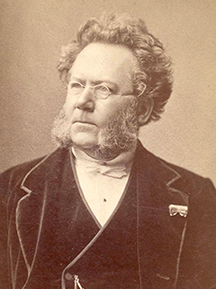Dramaturgical Resources
2014
An Enemy of the People
By Henrik Ibsen
Over the course of the season, our assistant directors and student dramaturgs will be compiling dramaturgical resources relating to each production as it develops. Below are some links to websites which relate to the history of the play, the biography of the playwright, and sites that contextualize and, we hope, shed light on the directorial approach to the dramatic material.
We hope you find these resources of interest.

Henrik Ibsen (20 March 1828 - 23 May 1906)

Christopher Hampton (b. 26 January 1946)
The Playwright
Often referred to as “the father of realism and modernism” in theatre, Henrik Ibsen was a Norwegian playwright and author of more than 25 plays between 1850 and 1899. He is perhaps best known, however, for the eight plays written outside of his homeland between the years of 1877 and 1890. These plays, renowned for their astringent social and governmental critique caused a great deal of controversy; both when they were originally performed and as a result of the various revivals throughout the intervening century and a half.
According to Professor Bjorn Hemmer at the University of Oslo, “[Ibsen] gave theatrical art a new vitality by bringing into European bourgeois drama an ethical gravity, a psychological depth, and a social significance which the theater had lacked since the days of Shakespeare.” His most renowned work, A Doll’s House, became the most performed play in the world earlier in the 20th century. It holds the title to this day.
Some of Ibsen's other, frequently performed works include, Peer Gynt (1867), Hedda Gabler, The Wild Duck (1884), Pillars of Society (1877), and Ghosts (1881); produced by The University of Rochester International Theatre Program in 1999). Ibsen was the recipient of numerous awards including The Knight's Grand Cross of the Order of St. Olav. Additionally, in 1996, an asteroid (number 5696) was named in his honor.
The Translator
Christopher Hampton is an Oxford educated British playwright and director and the recipient of numerous awards, including two Tonys, an Olivier, and an Academy Award. Referred to by critic, Caroline McGinn as “sophisticated, successful, and stylishly out of step with the British dramatic sensibility,” Hampton chose to translate An Enemy of the People into English from its original language of Dutch in 1998.
Hampton is the author of ten plays, four musicals (book and lyrics), eight adaptations, twenty-five screenplays, and eleven translations. Some of his most popular works include the 1993 musical Sunset Boulevard, the 1985 stage adaptation of the novel Les Liaisons Dangereuses, and the 2007 Academy Award winning film, Atonement.
Other Context for the Production
Read news about recent NSA whistleblower, Edward Snowden.
Read Weston Wilson’s 2004 letter to Congress about fracking and the EPA’s mishandling of the practice. This topic is the subject of the recent 2010 documentary Gasland. Check out the full documentary here. Gasland was the recipient of multiple awards, including a Primetime Emmy for Outstanding Direction in a Nonfiction Program.
Mary “Tipper” Gore was instrumental in the creation of the Parents Music Resource Center in 1985, which attempted to impose stricter guidelines on what types of music children would be able to access. Also in that year, the PMRC released the “Filthy Fifteen” a list of popular songs they recommended be banned or censored. Listen to this NPR story about Tipper Gore and government censorship of sensitive material.
Read about the Energy Policy Act of 2005 which expanded Congress’ regulatory toolbox for environmental decisions. The full document can be seen here.
